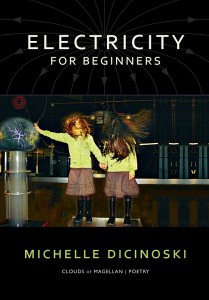 Electricity for Beginners by Michelle Dicinoski
Electricity for Beginners by Michelle Dicinoski
Clouds of Magellan, 2011
Electricity for Beginners, Michelle Dicinoski’s first poetry collection, has been dedicated in its title and opening pages to “beginners”. Dicinoski has been published previously in a number of publications including Meanjin, The Australian and The Best Australian Poems. So while this is a first collection, it is also a mature book of poetry and much more than a beginner’s exercise. The poems traverse different states of being and explore shifts in time in order to tell stories of love, family, friendship, and childhood, and often change focus and move seamlessly from momentary observations to future possibilities or predictions.
Dicinoski has a knack for turning the ordinary into the extraordinary so that there are many surprises in poems that are about mundane moments that might otherwise be forgotten. Almost innocuous moments, like watching a child swinging daringly from a trolley in Woolworths in the poem ‘Milk teeth’, listening to late night talk-back radio callers in ‘The city gauge’ and eating an apple with a new lover in ‘Good sign number two’, are recorded with a mixture of delicacy and humour. The collection is filled with such fleeting moments captured with wit; poems recall pub conversations, a kiss on the lips of a frozen bronze Thoreau and a strange instruction during a driving lesson.
But there is also the delicate intimacy in the sharing of family stories, the simple language that divulges family dynamics: “Whenever I ring, Mum calls him in / from the yard so we can speak. // We talk of cars and weather: / clutches, transmissions, the likelihood of rain.” There is also a wonderful economy of words in ‘Anointed’, a poem which expresses an adult child’s heartache while bathing her mother in a hospital.
These moments contrast the sexual tension and expressions of love created by physical proximity in poems like ‘The live arts’ and ‘Arterial’ where lovers share beds and stories and are entranced and distracted by breath. There is a sly declaration of love in ‘Lexicon’ which functions indirectly, as it is papered over with the pretence of admiring a large vocabulary. The enjambment of the first stanza cleverly thwarts our expectations as each line reveals an unexpected shift in meaning:
I don’t love you
for your beauty
alone,
but also for your large
vocabulary.
The words “alone” and “vocabulary” are unanticipated qualifiers. These kinds of unforseen modifying words appear throughout the collection and bring about sensations of revelation and delight, especially when “windowpanes rattle and / silverware, girlish, shivers in its drawers.” There is also an amusing play on the word “drawers” (furniture/ underwear) that adds to the surprise of the line.
Dicinoski’s love poems are electric, these are the poems for me that really hum with desire, warmth and intimacy, as Judith Beveridge has noted in her endorsement for the book. They have a sensuous pulse that is also found in what is one of the best flood poems I have read, ‘The city gauge’. There is a quietness, a softness in the language as “the water drinks the fusebox and the house blacks out.” One’s heart quickens as, “Every hour drowns another front step” or the inhabitants “raise our lives higher by torchlight” and “stack poems on clothing on mattress on table/ (how high is high enough?)/ till our histories loom all around us.” This poem, like many others in the collection, successfully moves between the present and the future:
Soon it will be dawn, soon it will be
Weirdly beautiful – the water a foot from the floorboards,
High-set verandahs kissing their reflections,
Six-foot fences vanquished – soon we’ll realise
we’re trapped.
In this and other poems Dicinoski’s gives voice to the urban and suburban condition. She refers to Melbourne, North Queensland and even Massachusetts, but the poems remain in many ways Brisbane poems, grounded by locations such as Fortitude Valley and the Brisbane Powerhouse and events such as the January 2011 floods. ‘Intimate not monumental’ is one poem that combines many such threads found throughout the collection. This poem fuses location – the fourth floor of a Fortitude Valley car park – with Dicinoski’s characteristic soft sensual pulse, her ability to capture the intimacy of proximity and her easy movement between one moment and future conversations. In this poem she arrests a few fleeting seconds as confetti is thrown and hangs in the air:
I know some things about gravity,
I know some things about bodies and heat
But I don’t know this –
the confetti doesn’t fall, but floats in place
in the air just above us.
Lit by streetlights or some
internal spark it’s a star cluster
a confetti constellation
that hangs together for long fat seconds.
This poem, like the entire collection, focuses on singular moments which are reflectively handled to produce a verse which elevates these encounters. The poems remove the subjects from their moorings for these examinations, and through the fractured use of time we are offered multiple perspectives on these moments. We gain unique, unqualified access to someone else’s everyday experiences with lovers, family and friends and this gives the poems resonance. Dicinoski’s voice comes through the poems; they are united not by subject so much as handling, by the poet’s seemingly effortless and intimate style. This is an alluring, expressive and well wrought collection.
Fiona Scotney is a PhD candidate at the University of Queensland writing a thesis on the Generation of 68 poets.













